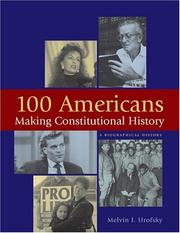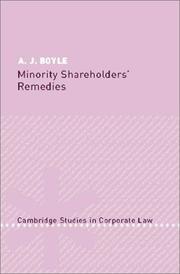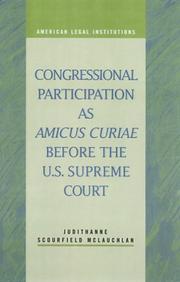| Listing 1 - 10 of 13 | << page >> |
Sort by
|

ISBN: 1322305382 1452267251 9781452235409 1604263148 9781452267258 9781604263145 9781452235400 1452235406 1568027990 9781568027999 9781604263145 9781322305387 Year: 2004 Publisher: Washington, D.C. : CQ Press,
Abstract | Keywords | Export | Availability | Bookmark
 Loading...
Loading...Choose an application
- Reference Manager
- EndNote
- RefWorks (Direct export to RefWorks)
Helps students understand the human side of the Supreme Court's decisions from the early republic to the present. Each biographical profile includes a discussion about the Court decision and how the specific legal issues evolved into great constitutional questions and drama.
Constitutional law --- Parties to actions --- United States.
Book
ISBN: 3845275928 9781509908929 3848732408 9783845275925 Year: 2018 Publisher: Baden-Baden, Germany : Hart Publishing : Nomos,
Abstract | Keywords | Export | Availability | Bookmark
 Loading...
Loading...Choose an application
- Reference Manager
- EndNote
- RefWorks (Direct export to RefWorks)
Amicus curiae participation in international courts is steadily growing since the late 1990 despite lack of clarity on the concept's nature, function and utility in international dispute settlement. Does amicus curiae infuse international judicial proceedings with alternative views, including the public interest in a case, as often advocated by NGOs? Does it increase the legitimacy and transparency of international dispute settlement, or the coherence of international law? Or is it an unhelpful impostor that impedes negotiated solutions and derails the proceedings at the expense of the parties to advance its own agenda? By way of an empirical-comparative analysis of the laws and practices of the ICJ, the ITLOS, the ECtHR, the IACtHR, the IACtHPR, WTO panels and the Appellate Body, and investment arbitration the dissertation examines the status quo of amicus curiae before international courts and tribunals to determine if the current amicus curiae practice is of added value to international proceedings and international dispute settlement in general. The dissertation shows that there is no common concept of international amicus curiae, but that amicus curiae before the international courts examined share a few characteristics. A proposed functional systematization highlights overlaps and diverging uses of the concept before international courts and helps scholars and practitioners to assess the opportunities and limits of the concept. Analysis of the concept's current regulatory framework and its substantive effectiveness reveals a hesitation in particular by courts with a strong adversarial tradition to take into account the views of a non-party despite the positive experience with the concept in regional human rights courts. The dissertation concludes that neither the expectations nor the concerns attached to amicus curiae participation in international proceedings have materialized. It argues that the concept can contribute to improved decisions and decision-making in international dispute settlement if regulated and used properly.
Amici curiae. --- International courts --- International tribunals --- Tribunals, International --- Courts --- Jurisdiction (International law) --- Amici curiae --- Friends of the court --- Parties to actions --- Law and legislation --- Law --- General

ISBN: 0521791065 0521169453 0511014325 0511175906 0511156588 0511304137 0511494742 128042995X 051104674X 1107121450 9780511014321 9780511175909 9780511494741 9780521791069 9780511046742 9781107121454 9780511156588 9780511304132 9780521169455 Year: 2002 Publisher: Cambridge, UK ; New York : Cambridge University Press,
Abstract | Keywords | Export | Availability | Bookmark
 Loading...
Loading...Choose an application
- Reference Manager
- EndNote
- RefWorks (Direct export to RefWorks)
A. J. Boyle assesses the state of English company law on minority shareholders' remedies from historical, theoretical and comparative perspectives in this important addition to Cambridge Studies in Corporate Law. He analyses the reforms of the UK Law Commission, which have been further appraised and amplified by the work in progress of the Company Law Review Steering Group. The book covers the common law actions by exception to the Rule in Foss v. Harbottle, and the statutory remedies by way of petition for unfair prejudice and/or just and equitable winding up. As well as considering the complexities of derivative actions and statutory minority remedies, Boyle discusses directions for minority shareholders' remedies. This book will be of interest to academics and practitioners in company and corporate law, particularly in the UK, US, France and Germany, as well as throughout the Commonwealth.
Minority stockholders --- Remedies (Law) --- Stockholders' derivative actions --- Legal status, laws, etc --- Minority shareholders --- Corporation law --- Stockholders --- Derivative actions --- Stockholder actions --- Stockholder suits --- Actions and defenses --- Parties to actions --- Legal status, laws, etc. --- Law --- General and Others --- Remedies (Law) - Great Britain.
Book
ISBN: 0838996930 0838996949 9780838996942 9780838996935 9780838911174 083891117X 9780838996959 0838996957 Year: 2014 Publisher: Chicago, [Illinois] : ALA Editions,
Abstract | Keywords | Export | Availability | Bookmark
 Loading...
Loading...Choose an application
- Reference Manager
- EndNote
- RefWorks (Direct export to RefWorks)
As both an attorney and a librarian, Healy's background makes him uniquely qualified to advise library staff on providing users with the legal information they seek.
Legal research --- Pro se representation --- Librarians --- Information scientists --- Library employees --- Libraries --- In propria persona --- Lay lawyers --- Litigants in person --- Pro persona --- Representation, Pro se --- Parties to actions --- Practice of law --- Representation in administrative proceedings --- Right to counsel --- Services for
Book
ISBN: 1139508059 1107229103 1280774002 9786613684776 113951766X 113951508X 0511998023 1139514164 1139516736 1139518593 9781139518598 9780511998027 9781107012271 1107012279 9781139516730 9781280774003 Year: 2012 Publisher: Cambridge ; New York : Cambridge University Press,
Abstract | Keywords | Export | Availability | Bookmark
 Loading...
Loading...Choose an application
- Reference Manager
- EndNote
- RefWorks (Direct export to RefWorks)
This in-depth comparative examination of the derivative action in Asia provides a framework for analysing its function, history and practical application and examines in detail how derivative actions law works in practice in seven important Asian jurisdictions (China, Hong Kong, India, Japan, Korea, Taiwan and Singapore). These case studies allow an evaluation of a number of the leading Western comparative corporate law and governance theories which have come to define the field over the last decade. By debunking some of these critically important theories, this book lays the foundation for an accurate understanding of the derivative action in Asia and a re-examination of the regulation of the derivative action around the world.
Stockholders' derivative actions --- Corporation law --- Company law --- Corporate law --- Corporations --- Law, Corporation --- Trusts, Industrial --- Commercial law --- Derivative actions --- Stockholder actions --- Stockholder suits --- Actions and defenses --- Parties to actions --- Stockholders --- Law and legislation --- Law --- General and Others
Book
ISBN: 178350952X 1783509511 1306573718 9781783509522 9781306573719 9781783509515 Year: 2014 Publisher: Bingley, England : Emerald Group Publishing,
Abstract | Keywords | Export | Availability | Bookmark
 Loading...
Loading...Choose an application
- Reference Manager
- EndNote
- RefWorks (Direct export to RefWorks)
This book focuses on the changing landscape of class action law and its interaction with the economic analysis of key issues in class actions. Articles examine the elements of class action law from diverse viewpoints, featuring defendant and plaintiff perspectives, concerning domestic and international law, and written by lawyers and economists.
Class actions (Civil procedure) --- Aggregate litigation (Class actions) --- Class action lawsuits --- Actions and defenses --- Civil procedure --- Complex litigation --- Public interest law --- Citizen suits (Civil procedure) --- Parties to actions --- Law of civil procedure --- Economic law --- Business & Economics --- Economics. --- Law and economics. --- Antitrust law --- General. --- Business Law. --- Economic aspects --- Economics and jurisprudence --- Economics and law --- Jurisprudence and economics --- Economics --- Jurisprudence

ISBN: 1593321651 9781593321659 1593320884 9781593320881 Year: 2005 Publisher: New York : LFB Scholarly Pub.,
Abstract | Keywords | Export | Availability | Bookmark
 Loading...
Loading...Choose an application
- Reference Manager
- EndNote
- RefWorks (Direct export to RefWorks)
Amici curiae --- Legislators --- Congressmen --- Congresswomen --- Members of Congress (United States) --- Members of Congress (United States House of Representatives) --- Members of Congress (United States Senate) --- Representatives in Congress (United States) --- Senators (United States) --- Friends of the court --- Parties to actions --- Law and legislation --- United States. --- Supreme Court (U.S.) --- Chief Justice of the United States --- Supreme Court of the United States --- 美國. --- Membership. --- Amicus curiae
Book
ISBN: 1593325045 9781593325046 1593324669 9781593324667 9781593324667 Year: 2012 Publisher: El Paso : LFB Scholarly Pub.,
Abstract | Keywords | Export | Availability | Bookmark
 Loading...
Loading...Choose an application
- Reference Manager
- EndNote
- RefWorks (Direct export to RefWorks)
Members of the Supreme Court are supposed to base decisions on the law, but often their choices are better explained by political ideology and party loyalty. Roberts sheds light on this problem by looking at a part of the Court's life that has never been systematically studied. Most cases feature extra briefs written by third parties known as amici curiae. He examines the rare occasions on which the Court allows these extra groups to participate not just by filing briefs but by appearing before the Court during oral arguments. By tracing how these groups influence the justices' behavior, Rober
Amici curiae --- Forensic orations --- Political questions and judicial power --- Public interest law --- Arguments, Legal --- Legal arguments --- Oral pleading --- Speeches, addresses, etc. --- Trial practice --- Forensic oratory --- Friends of the court --- Parties to actions --- Law and legislation --- United States. --- Supreme Court (U.S.) --- Chief Justice of the United States --- Supreme Court of the United States --- 美國. --- Decision making.
Book
ISBN: 9783866532311 9783866539679 3866539673 3866532318 Year: 2014 Publisher: Munich : Sellier European Louisiana Publishers GmbH,
Abstract | Keywords | Export | Availability | Bookmark
 Loading...
Loading...Choose an application
- Reference Manager
- EndNote
- RefWorks (Direct export to RefWorks)
Whether with regard to mass torts, civil-rights claims or as a means of private enforcement of antitrust and other regulatory policies: Collective redress of civil claims has been gaining in importance in Europe and worldwide. Long associated with the American model of class actions, an increasing number of EU Member States have made their own attempts at collective redress institutions. At the same time, the amendment of the Brussels I Regulation has shied away from dealing with the cross-border aspects of collective redress. In this book, a worldwide group of distinguished experts in private international law, civil procedure and regulatory law evaluate the problems of cross-border collective redress and provide proposals for a "European way" appropriate for the twenty-first century. This very topical work is, thus, indispensable for practitioners, academics, lobbyists and institutional agents.
Law of civil procedure --- European Union --- Class actions (Civil procedure) --- Exterritoriality --- Conflict of laws --- Recours collectifs (Procédure civile) --- Exterritorialité --- Procédure civile (Droit international privé) --- Civil procedure --- Class actions --- Droit privé (droit européen) --- Vente internationale --- Recours collectifs (droit) --- Droit international privé --- Recours collectifs (Procédure civile) --- Exterritorialité --- Procédure civile (Droit international privé) --- Droit international privé. --- Aggregate litigation (Class actions) --- Class action lawsuits --- Actions and defenses --- Complex litigation --- Public interest law --- Citizen suits (Civil procedure) --- Parties to actions --- Conflict of laws - Class actions - European Union countries --- Class actions (Civil procedure) - European Union countries
Book
ISBN: 9789004355811 9789004355828 9004355820 9004355812 Year: 2018 Volume: 3 Publisher: Leiden Brill Nijhoff
Abstract | Keywords | Export | Availability | Bookmark
 Loading...
Loading...Choose an application
- Reference Manager
- EndNote
- RefWorks (Direct export to RefWorks)
In this book Aoife Daly argues that where courts decide children’s best interests (for example about parental contact) the UN Convention on the Rights of the Child's 'right to be heard' is insufficient, and autonomy should instead be the focus. Global law and practice indicate that children are regularly denied due process rights in their own best interest proceedings and find their wishes easily overridden. It is argued that a children’s autonomy principle, respecting children’s wishes unless significant harm would likely result, would ensure greater support for children in proceedings, and greater obligations on adults to engage in transparent decision-making. This book is a call for a reconceptualisation of the status of children in a key area of children’s rights.
Autonomy in children. --- Children (International law). --- Children's rights. --- Due process of law. --- Locus standi. --- Convention on the Rights of the Child --- Children (International law) --- Child autonomy --- Child psychology --- Standing in court --- Parties to actions --- Procedure (Law) --- Access to justice (Due process of law) --- Procedural due process --- Substantive due process --- Civil rights --- Justice, Administration of --- International law --- Child rights --- Children --- Children's human rights --- Children's rights --- Rights of children --- Rights of the child --- Human rights --- Law and legislation --- Legal status, laws, etc. --- Right to participate in proceedings
| Listing 1 - 10 of 13 | << page >> |
Sort by
|

 Search
Search Feedback
Feedback About UniCat
About UniCat  Help
Help News
News